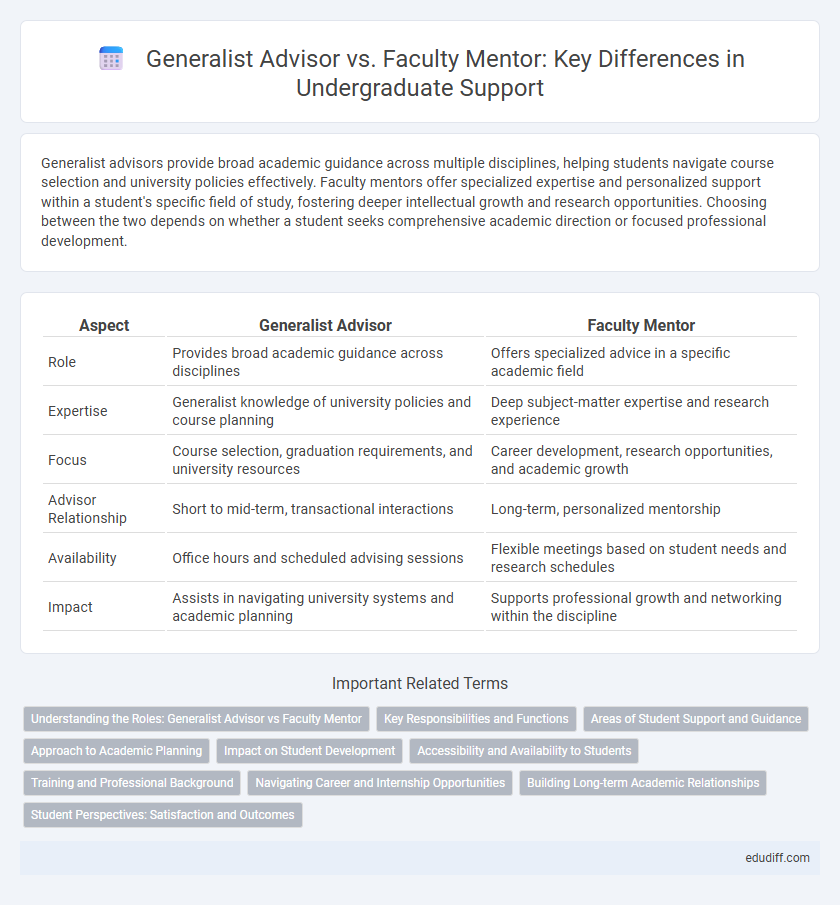Generalist advisors provide broad academic guidance across multiple disciplines, helping students navigate course selection and university policies effectively. Faculty mentors offer specialized expertise and personalized support within a student's specific field of study, fostering deeper intellectual growth and research opportunities. Choosing between the two depends on whether a student seeks comprehensive academic direction or focused professional development.
Table of Comparison
| Aspect | Generalist Advisor | Faculty Mentor |
|---|---|---|
| Role | Provides broad academic guidance across disciplines | Offers specialized advice in a specific academic field |
| Expertise | Generalist knowledge of university policies and course planning | Deep subject-matter expertise and research experience |
| Focus | Course selection, graduation requirements, and university resources | Career development, research opportunities, and academic growth |
| Advisor Relationship | Short to mid-term, transactional interactions | Long-term, personalized mentorship |
| Availability | Office hours and scheduled advising sessions | Flexible meetings based on student needs and research schedules |
| Impact | Assists in navigating university systems and academic planning | Supports professional growth and networking within the discipline |
Understanding the Roles: Generalist Advisor vs Faculty Mentor
Generalist advisors provide broad academic guidance and support on university policies, course selection, and degree requirements, ensuring students progress efficiently through their undergraduate programs. Faculty mentors offer specialized expertise within a student's major, fostering deeper academic engagement, research opportunities, and career development in specific fields of study. Understanding these distinct roles helps students leverage the comprehensive support system to optimize their academic and professional growth.
Key Responsibilities and Functions
Generalist advisors provide broad academic guidance, course planning, and university policy information to ensure students meet graduation requirements. Faculty mentors offer subject-specific expertise, research opportunities, and career development advice within a particular discipline. Both roles complement each other by combining administrative support with specialized academic mentorship to enhance undergraduate success.
Areas of Student Support and Guidance
Generalist advisors provide broad academic planning, course selection, and campus resource referrals to support overall student success, covering a wide range of disciplines. Faculty mentors offer specialized guidance within a specific major or field, helping students with career insights, research opportunities, and professional development tailored to their academic goals. Both roles are crucial for comprehensive student support, combining general institutional knowledge with expertise in the student's chosen area of study.
Approach to Academic Planning
A Generalist Advisor offers broad academic planning guidance across multiple disciplines, helping undergraduate students explore various majors and tailor course selections to meet graduation requirements. Faculty Mentors provide specialized, in-depth advice within a specific academic field, assisting students with research opportunities, career paths, and advanced coursework planning. This distinction enables students to receive both comprehensive degree planning and field-specific mentorship for academic and professional growth.
Impact on Student Development
Generalist advisors provide broad academic guidance and career planning support, promoting holistic student development across diverse disciplines. Faculty mentors offer specialized expertise and research opportunities, fostering deep intellectual growth and professional identity within a specific field. Both roles contribute uniquely by addressing different dimensions of student development, enhancing academic success and personal growth.
Accessibility and Availability to Students
Generalist advisors provide broad academic guidance and are typically more accessible through scheduled appointments and drop-in hours, offering flexible support to a diverse student body. Faculty mentors, often specializing in specific disciplines, may have limited availability due to research and teaching commitments but provide in-depth, personalized guidance aligned with students' major and career goals. The accessibility of generalist advisors ensures timely academic planning, while faculty mentors enhance specialized knowledge and professional networking opportunities.
Training and Professional Background
Generalist advisors typically possess broad training in academic counseling and career development, enabling them to support a wide range of student needs across multiple disciplines. Faculty mentors often have specialized expertise within a specific field, allowing them to provide in-depth guidance related to academic content, research opportunities, and professional development in their area of expertise. The professional background of generalist advisors usually includes certifications in student affairs or counseling, whereas faculty mentors are primarily experienced scholars or practitioners in their academic disciplines.
Navigating Career and Internship Opportunities
Generalist advisors provide broad support across various departments, offering diverse resources for career exploration and internship placements tailored to multiple fields. Faculty mentors deliver specialized guidance within a student's area of study, leveraging industry connections and academic expertise to secure targeted internship opportunities. Both play crucial roles in navigating career paths, with generalists facilitating wide-ranging options and faculty mentors focusing on depth within specific disciplines.
Building Long-term Academic Relationships
Generalist advisors provide broad guidance across various disciplines, helping undergraduates navigate academic requirements and career options effectively. Faculty mentors offer deeper, subject-specific expertise, fostering long-term scholarly development through personalized research opportunities and professional networking. Establishing both connections enhances academic growth by combining comprehensive support with specialized mentorship.
Student Perspectives: Satisfaction and Outcomes
Undergraduate students often report higher satisfaction with generalist advisors due to their broad knowledge of academic requirements and flexible availability, which supports timely course selection and degree progression. However, faculty mentors tend to enhance student outcomes by providing specialized guidance, research opportunities, and professional networking within specific disciplines. Balancing access to both generalist advising and dedicated faculty mentorship contributes to improved academic performance and career readiness.
Generalist Advisor vs Faculty Mentor Infographic

 edudiff.com
edudiff.com